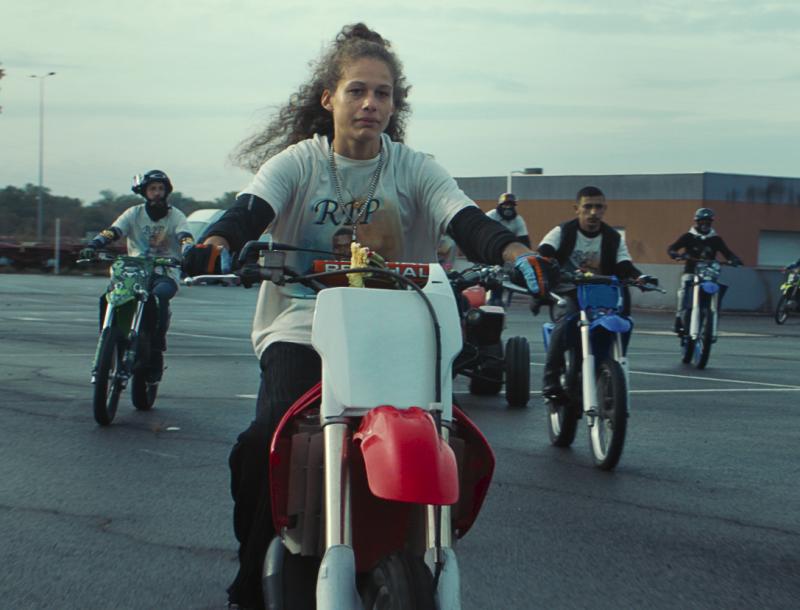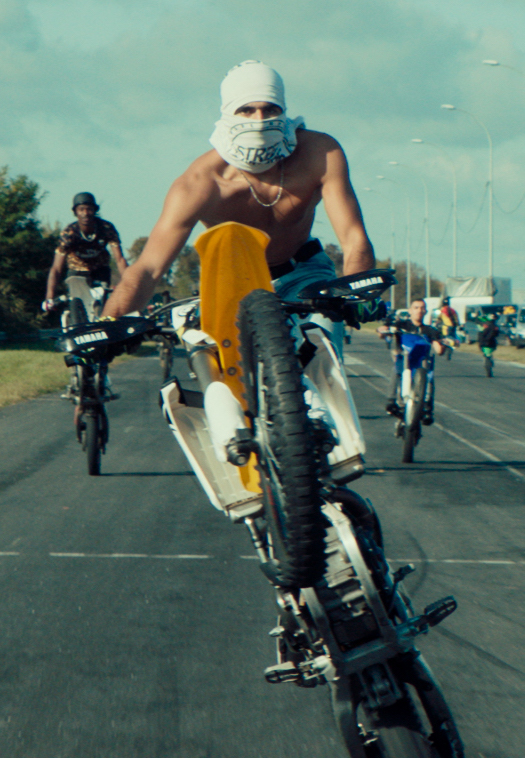Rodéo review - heroine from the banlieues powers a rebel-teens saga | reviews, news & interviews
Rodéo review - heroine from the banlieues powers a rebel-teens saga
Rodéo review - heroine from the banlieues powers a rebel-teens saga
Impressive vérité portrait of a French dirt-biking gang

Reading an interview with the French director of Rodéo, Lola Quivoron, you come to realise her compelling film about dirt-bike-rider culture relied on a sage piece of casting. Despairing of ever finding a lead for her film project, Quivoron chanced upon Julie Ledru on Instagram and the first-time actor became a key creator of the narrative.
The lone girl rider in a gang of illegal road-bikers, Ledru’s Julia (main picture) is a uniquely impressive character: mixed race, fearless, and far more emotionally intelligent than the young men she hangs out with. Ledru, like Julia, is from the banlieues north of Paris. Her astounding performance is as assured as a pro’s of long experience, but wholly natural.
Quivoron spent four years getting to know the kids chewing up the roads while dodging cops and injury. These are daredevils who can make their bikes rear up like horses so they are almost perpendicular, and balance on the saddle one-legged at high speed. The sequences shot at close range during these rides are exhilarating and satisfyingly noisy (pictured below right).
The film has a fairly standard set-up. A young woman runs away from the soulless building where she lives with her mother and brother, and immediately establishes she is a maverick spirit by “punking” a bike she has found on eBay, pretending to be an interested buyer and then riding off on it, with a middle-finger salute to its owner.

This is Julia’s whole way of life. She tells a woman who has sold her soul for financial security that she herself has no need of money as she just steals everything she needs. She is often sullen and foul-mouthed, her expression closed off and bruised. But once on her bike, with her long curly hair streaming behind her, an ecstatic grin on her face and a roar in her throat, Julia is like an avenging angel, out to punish the world for the raw deal life has given her. “I was born with a bike between my legs,” she tells a man whose bike she is about to steal. She has a pseudo-sexual relationship with the bikes, caressing them like lovers.
When Julia tries to join a gang of daredevil riders whose stunts she admires, she is rebuffed, told to get out of the way, because her bike is too slow. Most of the young men are committed misogynists who ignore her advice when a much-loved biker is hurt and she insists he needs hospital care. (He does.) One, Kaïs (Yannis Lafki), lets her sleep in the garage where he and some of the other riders retool old and stolen bikes and sell them on. He becomes a tentative friend and mentor to Julia as she becomes a useful punker. Soon the boss, Domino, who controls the bikers by mobile phone from his prison cell, notices her skills.
Julia hankers after bigger and better horsepower machines. It’s not long before she's planning a heist from a moving truck full of top-of-the-range bikes and becomes an integral part of the gang. But this is a man’s world, and her enemy in the group, Kamel, has still not accepted her right to ride with them.
Quivoron neatly accelerates into the heist plot for the last section of the film, while also giving Julia an emotional focus, in the form of Domino’s wife, Ophélie (Antonia Buresi), whose unruly little son Julia understands and is able to calm.
Julie's affection for Ophélie helps the other woman find a kind of release, too. One of the men has previously branded Julia a witch, but she is more a white witch, a self-sufficient woman with healing skills.
As is usually the fate of women accused of witchcraft, though, Julia is vulnerable, unable to defend herself against male violence, for all her tough-guy posturing and spliff-smoking. She can’t live this way, but she can’t live any other way, and she embraces her choice whole-heartedly.
Quivoron doesn’t editorialise or emotionally weight the narrative. This is verité filming with an almost documentary feel for long stretches, played out with a moody backing track of rap and urban guitar that sounds remote and alien, as if recorded in a big empty warehouse.
Some of its cast are real dirt-bikers, happy to show off their skills for the cameras. You sense it’s their only way of challenging the status quo and making a mark. The world of La Haine is almost 30 years old now, and it seems not much has changed in it for the better.
The future of Arts Journalism
You can stop theartsdesk.com closing!
We urgently need financing to survive. Our fundraising drive has thus far raised £49,000 but we need to reach £100,000 or we will be forced to close. Please contribute here: https://gofund.me/c3f6033d
And if you can forward this information to anyone who might assist, we’d be grateful.

Subscribe to theartsdesk.com
Thank you for continuing to read our work on theartsdesk.com. For unlimited access to every article in its entirety, including our archive of more than 15,000 pieces, we're asking for £5 per month or £40 per year. We feel it's a very good deal, and hope you do too.
To take a subscription now simply click here.
And if you're looking for that extra gift for a friend or family member, why not treat them to a theartsdesk.com gift subscription?
more Film
 Train Dreams review - one man's odyssey into the American Century
Clint Bentley creates a mini history of cultural change through the life of a logger in Idaho
Train Dreams review - one man's odyssey into the American Century
Clint Bentley creates a mini history of cultural change through the life of a logger in Idaho
 Palestine 36 review - memories of a nation
Director Annemarie Jacir draws timely lessons from a forgotten Arab revolt
Palestine 36 review - memories of a nation
Director Annemarie Jacir draws timely lessons from a forgotten Arab revolt
 Relay review - the method man
Riz Ahmed and Lily James soulfully connect in a sly, lean corporate whistleblowing thriller
Relay review - the method man
Riz Ahmed and Lily James soulfully connect in a sly, lean corporate whistleblowing thriller
 Die My Love review - good lovin' gone bad
A magnetic Jennifer Lawrence dominates Lynne Ramsay's dark psychological drama
Die My Love review - good lovin' gone bad
A magnetic Jennifer Lawrence dominates Lynne Ramsay's dark psychological drama
 Bugonia review - Yorgos Lanthimos on aliens, bees and conspiracy theories
Emma Stone and Jesse Plemons excel in a marvellously deranged black comedy
Bugonia review - Yorgos Lanthimos on aliens, bees and conspiracy theories
Emma Stone and Jesse Plemons excel in a marvellously deranged black comedy
 theartsdesk Q&A: director Kelly Reichardt on 'The Mastermind' and reliving the 1970s
The independent filmmaker discusses her intimate heist movie
theartsdesk Q&A: director Kelly Reichardt on 'The Mastermind' and reliving the 1970s
The independent filmmaker discusses her intimate heist movie
 Blu-ray: Wendy and Lucy
Down-and-out in rural Oregon: Kelly Reichardt's third feature packs a huge punch
Blu-ray: Wendy and Lucy
Down-and-out in rural Oregon: Kelly Reichardt's third feature packs a huge punch
 The Mastermind review - another slim but nourishing slice of Americana from Kelly Reichardt
Josh O'Connor is perfect casting as a cocky middle-class American adrift in the 1970s
The Mastermind review - another slim but nourishing slice of Americana from Kelly Reichardt
Josh O'Connor is perfect casting as a cocky middle-class American adrift in the 1970s
 Springsteen: Deliver Me From Nowhere review - the story of the Boss who isn't boss of his own head
A brooding trip on the Bruce Springsteen highway of hard knocks
Springsteen: Deliver Me From Nowhere review - the story of the Boss who isn't boss of his own head
A brooding trip on the Bruce Springsteen highway of hard knocks
 The Perfect Neighbor, Netflix review - Florida found-footage documentary is a harrowing watch
Sundance winner chronicles a death that should have been prevented
The Perfect Neighbor, Netflix review - Florida found-footage documentary is a harrowing watch
Sundance winner chronicles a death that should have been prevented
 Blu-ray: Le Quai des Brumes
Love twinkles in the gloom of Marcel Carné’s fogbound French poetic realist classic
Blu-ray: Le Quai des Brumes
Love twinkles in the gloom of Marcel Carné’s fogbound French poetic realist classic
 Frankenstein review - the Prometheus of the charnel house
Guillermo del Toro is fitfully inspired, but often lost in long-held ambitions
Frankenstein review - the Prometheus of the charnel house
Guillermo del Toro is fitfully inspired, but often lost in long-held ambitions

Add comment